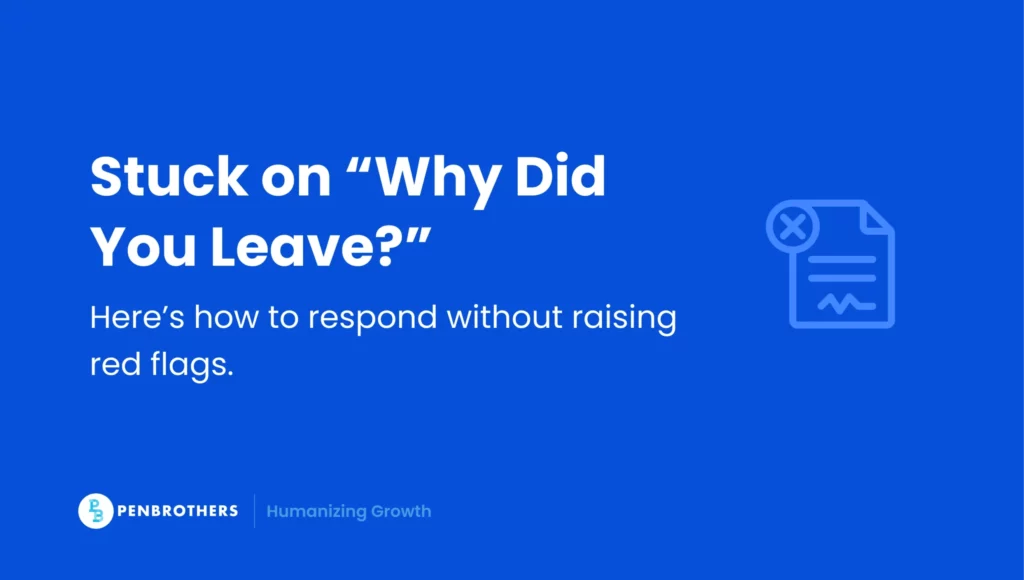Job seekers often find the interview question “Why did you leave your previous job?” challenging. But your answer does more than justify your departure. It shapes how employers perceive your career choices, adaptability, and fit for their team. Hiring managers aren’t just looking for an explanation. They’re evaluating how you navigate change and present yourself professionally.
A well-crafted response can strengthen your candidacy, while a misstep can raise red flags. This guide will help you frame your answer strategically, avoid common pitfalls, and turn this question into an opportunity to get closer to your new job.
Why This Question Matters to Employers
Hiring managers want to understand:
- Your career priorities: Do you make strategic moves that reflect ambition and foresight?
- Your professionalism: Can you discuss past roles with diplomacy and maturity?
- Your cultural and job fit: Will you thrive in their work environment?
- Your stability: Are you intentional about career moves, or do you leave at the first challenge?
Your response should position you as a professional who makes deliberate career decisions.
How to Explain Why You Left a Job (With Impactful Sample Answers)
Your answer should align with your career path and reinforce your value. Here are effective ways to frame your response:
1. Limited Growth Opportunities
One of the reasons why employees say they would stay longer at a company is if it invested in their career development. When that investment is missing, moving on is a natural next step.
Best Answer:
“I’ve developed strong expertise in my current role, but advancement is limited. I’m looking for an opportunity to take on greater responsibilities in [specific area] and continue growing professionally.”
Why it works: It positions you as proactive and focused on career progression.
2. Seeking More Challenge
When roles become too repetitive, engagement and productivity decline. Seeking a role that stretches your skills is a legitimate and strategic career move.
Best Answer:
“I perform best in environments where I can tackle complex projects and expand my skills. My current role has become repetitive, and I’m eager for new challenges that allow me to contribute at a higher level.”
Why it works: Demonstrates motivation for meaningful work rather than dissatisfaction.
3. Company Restructuring or Layoff
Layoffs are a reality in today’s market. Economic shifts, mergers, or budget cuts often leave skilled professionals seeking new roles.
Best Answer:
“A corporate reorganization led to workforce reductions, including my department. While unexpected, it gave me the opportunity to reassess my strengths and focus on roles that align more closely with my expertise.”
Why it works: It keeps the explanation factual and forward-looking.
4. Leadership or Cultural Misalignment
Culture fit is a top reason employees leave jobs. When leadership styles or workplace values don’t align with your own, finding a better fit can improve job satisfaction and performance.
Best Answer:
“I’m looking for an organization that prioritizes [specific value, e.g., innovation, collaboration]. I want to be part of a team that aligns with my work philosophy and professional goals.”
Why it works: It addresses misalignment professionally without negativity.
5. Competitive Compensation & Benefits
Pay transparency and market competitiveness are driving job changes. If your salary no longer reflects your skills and market value, seeking better compensation is a practical decision.
Best Answer:
“Compensation is one factor, but I’m primarily looking for a role that recognizes my contributions and provides long-term growth opportunities.”
Why it works: This shows that career progression and job satisfaction are your primary motivators.
6. Relocation
Relocation is often driven by family needs, lifestyle changes, or cost-of-living adjustments.
Best Answer:
“I recently relocated to [new location] and am seeking a long-term opportunity where I can contribute my skills in [industry or expertise].”
Why it works: It maintains focus on continuity in your career rather than personal circumstances.
7. Career or Industry Shift
Career changers move to entirely different industries for better job satisfaction, higher salaries, or alignment with personal interests. Strategic shifts require reskilling and proactive career planning.
Best Answer:
“I’ve built a strong foundation in [previous industry], but I’ve always been passionate about [new industry]. I’ve proactively gained relevant skills and experience, and this role aligns with my career transition.”
Why it works: This demonstrates strategic planning and skill development.
8. Further Education or Certification
Lifelong learning is essential in today’s fast-evolving job market. If you left a job to pursue education, it demonstrates a commitment to professional development.
Best Answer:
“I took time to pursue additional education in [specific field], which has expanded my expertise. I’m now eager to apply my knowledge in a professional setting.”
Why it works: It highlights continuous learning and professional development.
What You Should Never Say About Leaving a Job
Avoid responses that could raise concerns about your professionalism or work ethic. Negative or vague answers can make employers question your attitude, reliability, or ability to handle workplace challenges. Here are the most common ones and how you can reframe each of them.
“I hated my boss.”
Why it’s a problem: Speaking negatively about a previous employer can make you seem difficult to work with.
Better approach:
“I’m looking for a workplace that values mentorship and collaboration. Your leadership culture strongly aligns with what I’m seeking.”
“The work environment was toxic.”
Why it’s a problem: It can make you seem unable to navigate workplace challenges.
Better approach:
“I’m looking for a company that prioritizes teamwork and a positive work culture, which is why this opportunity stands out to me.”
“I was overworked and underpaid.”
Why it’s a problem: Complaints about workload and salary can raise concerns about motivation.
Better approach:
“I want to be in a role where my contributions are recognized and where I can continue growing professionally.”
“I just needed a change.”
Why it’s a problem: Too vague and hiring managers may question your career direction.
Better approach:
“I’m looking to take on more responsibility and develop [specific skills] in a role that aligns with my long-term goals.”
Handling Follow-Up Questions
Potential employers may ask additional questions to test your reasoning. Prepare for these with confident responses.
Question:
“If we spoke to your previous manager, how would they describe your departure?”
Why They Ask:
This question tests your credibility and professional relationships. Recruiters want to ensure you left on good terms and that your explanation aligns with what they might hear from references.
Best Answer:
“My manager would describe my departure as professional and well-communicated. I provided ample notice, ensured a smooth transition, and maintained strong relationships with my team. In fact, I’d be happy to provide references who can speak to my contributions.”
Expert Tip:
Even if you left under difficult circumstances, focus on how you handled it professionally rather than the issues themselves. If possible, offer a reference to reinforce credibility.
Question:
“How did you try to improve the situation before resigning?”
Why They Ask:
Employers want to see if you made an effort to resolve any issues before resigning. A hasty departure can signal impulsiveness or a lack of resilience.
Best Answer:
“Before making my decision, I had conversations with leadership about opportunities for growth and took on additional projects to expand my skill set. However, it became clear that long-term advancement wasn’t possible in my role, which led me to seek new challenges elsewhere.”
Expert Tip:
Always show that you explored solutions before leaving. This demonstrates problem-solving skills and professional maturity.
Question:
“What factors led to your decision to leave before securing a new role?”
Why They Ask:
Leaving a job without securing another can raise red flags. Employers want to gauge whether your departure was strategic or if there were performance concerns.
Best Answer:
“I made a calculated decision to step away to focus on finding the right fit. Rather than rushing into the first available opportunity, I’ve been selective in targeting roles that align with my expertise and career trajectory.”
Expert Tip:
Emphasize intentionality rather than desperation. Show that you prioritized the right move over a quick one.
Move Forward with Confidence
Your reason for leaving isn’t just an answer. It’s a strategic positioning tool. Use it to demonstrate growth, adaptability, and clarity in your career direction.
- Control the narrative. Frame your departure as a step toward something better, not just an escape from something worse.
- Keep it high-impact. Every word should reinforce your value, not just fill space.
- Stay future-focused. Employers hire for potential, not just experience. Shift the conversation to what you bring to the table.
- Turn obstacles into assets. Even a layoff or toxic workplace can be positioned as a catalyst for professional growth.
The best answer doesn’t just explain why you left. It makes employers excited about where you’re headed next. Ready to make your next move? Explore open roles and step into your next opportunity just like Nina.






